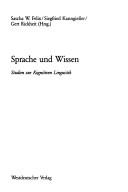| Listing 1 - 10 of 661 | << page >> |
Sort by
|
Book
ISBN: 9811637423 9811637415 Year: 2021 Publisher: Gateway East, Singapore : Springer,
Abstract | Keywords | Export | Availability | Bookmark
 Loading...
Loading...Choose an application
- Reference Manager
- EndNote
- RefWorks (Direct export to RefWorks)
Book
ISBN: 8322641850 Year: 2022 Publisher: Katowice : Uniwersytet Śląski,
Abstract | Keywords | Export | Availability | Bookmark
 Loading...
Loading...Choose an application
- Reference Manager
- EndNote
- RefWorks (Direct export to RefWorks)
The paper deals with Russian folk tales and legends describing death, dying, actions and roles of their protagonists with regard not only to their present state and condition but also to their future ones. The image of Death as a significant figure has been characterized from the point of view of its various meanings. The world of objects is described as a special one with regard to the reality, influencing people and being influenced by them. The author suggests a number of attitudes towards the potential, virtual typologies connected with the meanings of the paradigmatic units. The units are also discussed in terms of their internal structure and position in general semantics.
Book
ISBN: 3031104226 3031104218 Year: 2023 Publisher: Cham, Switzerland : Palgrave Macmillan,
Abstract | Keywords | Export | Availability | Bookmark
 Loading...
Loading...Choose an application
- Reference Manager
- EndNote
- RefWorks (Direct export to RefWorks)
Book
ISBN: 832420346X Year: 2003 Publisher: Kraków : Universitas,
Abstract | Keywords | Export | Availability | Bookmark
 Loading...
Loading...Choose an application
- Reference Manager
- EndNote
- RefWorks (Direct export to RefWorks)
Book
Year: 2023 Publisher: Bern : Peter Lang International Academic Publishers,
Abstract | Keywords | Export | Availability | Bookmark
 Loading...
Loading...Choose an application
- Reference Manager
- EndNote
- RefWorks (Direct export to RefWorks)
Commitment is connected to central linguistic features, such as modality and evidentiality. It has thus been investigated in many branches of the field. Building upon this heterogeneous literature, this book offers a cognitive pragmatic account of the processes involved in utterance interpretation, crucially when the hearer assesses the level of commitment linked to it. This research illustrates that the relevance-theoretic notion of strength can be used to capture the cognitive effects of commitment markers (as I think that X, I am sure that X, etc.). The author's model is based on a novel typology as well as predictions which were experimentally tested. The results show that commitment to an utterance is indeed cognitively determined by the strength of the hearer's corresponding assumptions.

ISBN: 3531120980 Year: 1990 Publisher: Opladen Westdeutscher Verl.
Abstract | Keywords | Export | Availability | Bookmark
 Loading...
Loading...Choose an application
- Reference Manager
- EndNote
- RefWorks (Direct export to RefWorks)
Book
Year: 2023 Publisher: Bern : Peter Lang International Academic Publishers,
Abstract | Keywords | Export | Availability | Bookmark
 Loading...
Loading...Choose an application
- Reference Manager
- EndNote
- RefWorks (Direct export to RefWorks)
Commitment is connected to central linguistic features, such as modality and evidentiality. It has thus been investigated in many branches of the field. Building upon this heterogeneous literature, this book offers a cognitive pragmatic account of the processes involved in utterance interpretation, crucially when the hearer assesses the level of commitment linked to it. This research illustrates that the relevance-theoretic notion of strength can be used to capture the cognitive effects of commitment markers (as I think that X, I am sure that X, etc.). The author's model is based on a novel typology as well as predictions which were experimentally tested. The results show that commitment to an utterance is indeed cognitively determined by the strength of the hearer's corresponding assumptions.
Book
ISBN: 9783631637654 Year: 2013 Publisher: Frankfurt am Main Lang
Abstract | Keywords | Export | Availability | Bookmark
 Loading...
Loading...Choose an application
- Reference Manager
- EndNote
- RefWorks (Direct export to RefWorks)
Book
Year: 2018 Publisher: Amsterdam ; Philadelphia : John Benjamins Publishing Company,
Abstract | Keywords | Export | Availability | Bookmark
 Loading...
Loading...Choose an application
- Reference Manager
- EndNote
- RefWorks (Direct export to RefWorks)
We hope that the present volume will not only contribute to a better understanding of how CL can be applied but that it will also help to encourage, even further, more robust empirical research in this field. Originally published as a special issue of Review of Cognitive Linguistics 14:1 (2016).
Book
Year: 2015 Publisher: Berlin, [Germany] : Frank & Timme,
Abstract | Keywords | Export | Availability | Bookmark
 Loading...
Loading...Choose an application
- Reference Manager
- EndNote
- RefWorks (Direct export to RefWorks)
Long description: Scientific and Technical Translation (STT) is a highly complex and knowledge-intensive field of translation and cognitive linguistics is a usage-based linguistic framework which provides powerful theoretical tools for modelling knowledge organisation and representation in discourse. This book explores the interface between scientific and technical translation studies and cognitive linguistics by discussing the epistemological, contextual, textual and cross-linguistic dimensions of scientific and technical translation from a cognitive linguistic perspective. Particular emphasis is placed on explicitation and implicitation as indicators of the interaction between text and context in STT. The corpusbased investigation of the two phenomena illustrates the complex knowledge requirements pertaining to scientific and technical translation and demonstrates the explanatory power of cognitive linguistics with regard to important textual and contextual aspects of STT. Biographical note: Ralph Krüger is a lecturer in translation studies and specialised translation at the Institute of Translation and Multilingual Communication at Cologne University of Applied Sciences, Germany. He holds a Ph.D. in translation studies from the University of Salford, UK. His research interests focus on cognitive theories of translation, the application of electronic corpora in translation teaching and the didactics of specialised translation. Prior to joining academia, he worked as specialised translator for a major German translation company.
| Listing 1 - 10 of 661 | << page >> |
Sort by
|

 Search
Search Feedback
Feedback About UniCat
About UniCat  Help
Help News
News